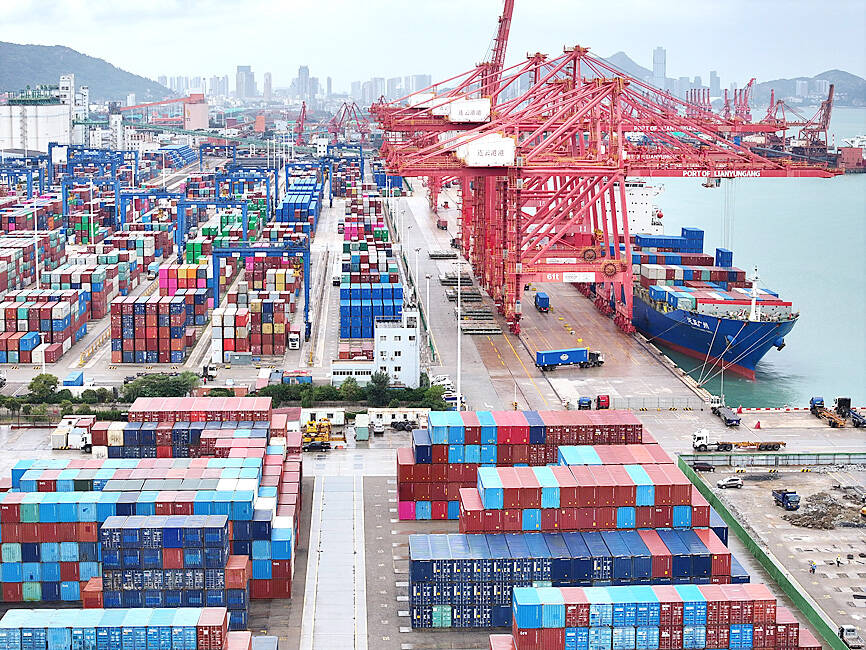Foreign buyers are the primary source driving shipbuilding production in China, with Taiwan-based Evergreen Marine Corp (長榮海運) being one of them especially concerning, the Center for Strategic and International Studies (CSIS) said.
In its 69-page report Ship Wars: Confronting China’s Dual-Use Shipbuilding Empire published on Tuesday last week, the Washington-based think tank said much of the production was carried out at tier-1 and tier-2 shipyards.
The CSIS study categorizes each of the 307 Chinese shipyards active from 2019 to last year into four tiers that reflect their degree of integration with China’s military industrial ecosystem, with tier-1 being “very high risk” while tier-2 means “lower risk.”

Photo: Reuters
‘STRIKING’
More than 75 percent of the production at these shipyards were sold to for firms based outside of China or Hong Kong, including US military allies such as Denmark, France, Japan, South Korea, and most strikingly Taiwan, the CSIS said.
“Taiwan’s position as a top client of China’s naval shipyards is particularly striking, given the direct threat the PLAN’s [Chinese People’s Liberation Army Navy] rapid expansion poses to the island’s security,” it said.
Citing Evergreen, the largest container cargo shipper in Taiwan, the CSIS said that 15 percent of its active fleet was built at tier-1 shipyards, with more on order.
RISKS
Many of those orders have gone to tier-1 shipyards such as Hudong-Zhonghua and Jiangnan, which are the same facilities that produce warships explicitly designed to support the PLAN in conducting amphibious assaults or other military operations across the Taiwan Strait, it added.
While companies buy vessels from China due to their lower costs, “governments should balance the potential benefits of cost savings with the risk of contributing to China’s naval development,” the CSIS said.
Tier-1 shipyards receive substantial state funding and contracts, ensuring a steady stream of resources to fuel rapid production, the think tank said.
As such, “these dual-use facilities blur the line between commercial and military activity, leveraging their infrastructure and output to accelerate naval production,” it added.
The CSIS advised Washington to encourage its allies to take quiet, informal actions to discourage their companies from buying from tier-1 shipyards.
“This is particularly true of Taiwan, as it stands to lose the most from China’s ongoing naval modernization,” it said.

Chinese spouse and influencer Guan Guan’s (關關) residency permit has been revoked for repeatedly posting pro-China videos that threaten national security, the National Immigration Agency confirmed today. Guan Guan has said many controversial statements in her videos posted to Douyin (抖音), including “the red flag will soon be painted all over Taiwan” and “Taiwan is an inseparable part of China,” and expressing hope for expedited reunification. The agency last year received multiple reports alleging that Guan Guan had advocated for armed reunification. After verifying the reports, the agency last month issued a notice requiring her to appear and explain her actions. Guan

GIVE AND TAKE: Blood demand continues to rise each year, while fewer young donors are available due to the nation’s falling birthrate, a doctor said Blood donors can redeem points earned from donations to obtain limited edition Formosan black bear travel mugs, the Kaohsiung Blood Center said yesterday, as it announced a goal of stocking 20,000 units of blood prior to the Lunar New Year. The last month of the lunar year is National Blood Donation Month, when local centers seek to stockpile blood for use during the Lunar New Year holiday. The blood demand in southern Taiwan — including Tainan and Kaohsiung, as well as Chiayi, Pingtung, Penghu and Taitung counties — is about 2,000 units per day, the center said. The donation campaign aims to boost

The Kaohsiung Tourism Bureau audited six hotels in an effort to prevent price gouging ahead of Korean band BTS’ concert tour in the city scheduled for Nov. 19, 21 and 22 this year. The bureau on Friday said that the audits — conducted in response to allegations of unfair pricing posted on social media — found no wrongdoing. These establishments included the local branches of Chateau de Chine, Hotel Nikko, My Humble House, and Grand Hai Lai, it said, adding that the Consumer Protection Commission would have penalized price gougers had the accusations been substantiated. The bureau said the Tourism Development Act

A preclearance service to facilitate entry for people traveling to select airports in Japan would be available from Thursday next week to Feb. 25 at Taiwan Taoyuan International Airport, Taoyuan International Airport Corp (TIAC) said on Tuesday. The service was first made available to Taiwanese travelers throughout the winter vacation of 2024 and during the Lunar New Year holiday. In addition to flights to the Japanese cities of Hakodate, Asahikawa, Akita, Sendai, Niigata, Okayama, Takamatsu, Kumamoto and Kagoshima, the service would be available to travelers to Kobe and Oita. The service can be accessed by passengers of 15 flight routes operated by